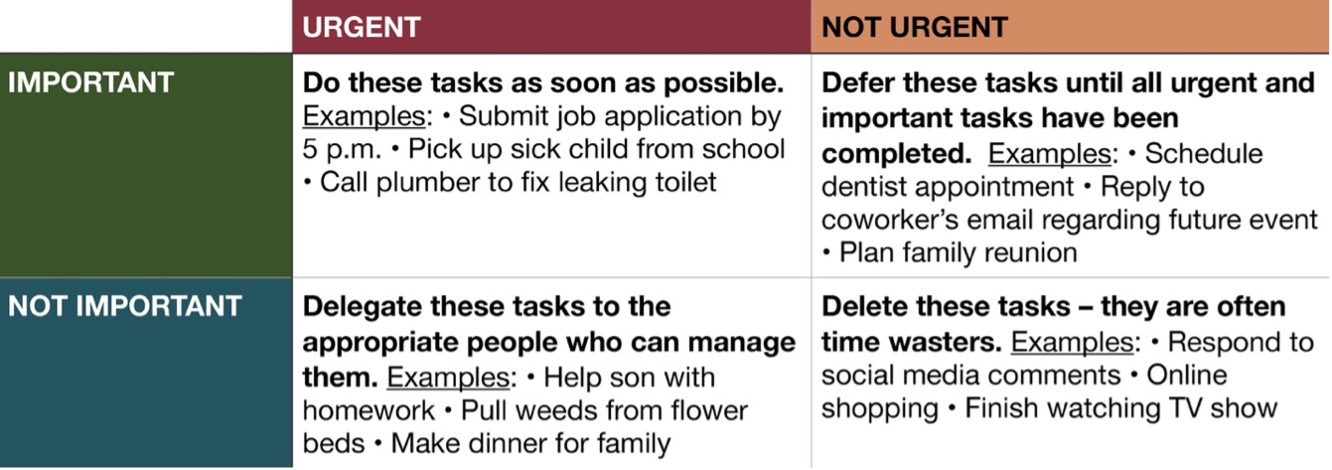Who doesn’t wish they had better time management skills? Time management is not just critical to our productivity, but also to our well-being and our overall success.
Time management seems to be on everyone’s mind. When talking to nearly anyone who works, lives, or breathes, it’s quite common to hear them say, “I don’t have enough time” or “I wish I had more time.”
When we are busy — juggling multiple tasks, priorities and responsibilities — it can seem that we lose time. While we can’t really LOSE it, we can definitely waste it.
And since the time we have available to us is finite, in order to get the things done that we need to — to be productive and achieve the results we desire both personally, and professionally — we need to use the time we do have efficiently and effectively. This is really the premise of time management—managing our time efficiently and effectively so that we are able to do and accomplish those things that are required by our roles and responsibilities.
Here’s the “official” definition of time management:
“Time management” is the process of organizing and planning how to divide your time between specific activities. … Failing to manage your time damages your effectiveness and causes stress.
Time management is important for two reasons:
- Learning and honing time management skills can improve our performance and the results we are able to achieve
- Improving time management can reduce stress, improving our wellbeing.
Greater time management equates to more personal satisfaction, greater fulfillment, and less stress—all things that combine to a general state of well-being.
For most of us, strong time management skills aren’t something we’re born with. The good news is that there are plenty of proven, time-tested, strategies for improving time management.
Here are 10 things you can do to improve your time management.
ONE – PERFORM A TIME AUDIT
We have to know where we are spending our time — and wasting it — to know where we need to get better.
Try making a time log. Record what you are doing for a week — or 2 to 3 days minimum — in 15 minute intervals.
Evaluate your results and ask yourself:
- Did everything I need to do get done?
- Which tasks required the most time?
- What time of day was I most productive?
- Where was most of my time devoted?
Identifying the most time-consuming tasks and determining where and how your time might be better spent is the first step on the road to “time management recovery.”
TWO – SET PRIORITIES
A lot of the time we find ourselves “busy” but not really getting a lot done. A big part of that is not understanding the difference between “important” and “urgent.” Quite often, they aren’t the same thing.
Time management experts Covey, Merrill, and Merrill suggest categorizing activities into 4 quadrants in their Time Management :Urgent, Important, Not Urgent, Not Important.
See the example below.
 Focusing on tasks that are urgent AND important gives us greater control over our time and reduces the number of important tasks that become urgent.
Focusing on tasks that are urgent AND important gives us greater control over our time and reduces the number of important tasks that become urgent.
THREE – GET ORGANIZED
Disorganization has been proven to lead to poor time management. Research done by Ferrari Roster and M Jurkat in a 2016 issue of the Journal of Environmental Psychology says that clutter has a strong negative impact on perceived wellbeing.
To improve our time management, we need to get organized. Try organizing your physical space as well as your informational spaces such as your email inbox.
FIVE – SCHEDULE INTELLIGENTLY
Scheduling your day intelligently is not just recording the things you have to do. It needs to include time for things we want to do and account for how we feel when we are doing both.
Using your time log, you can determine the times of day where you’re most productive, and then prioritize your to-do list from there. Do less important tasks when you’re at your least productive is a great way. You should also avoid non-productive activities unless you need a break, and don’t schedule your whole day so you have time for creativity, planning, and innovation.
SIX – USE TIME MANAGeMENT SKILLS
Some of these time management tools that can help us be more productive include websites and apps that are specifically designed for time management. And the good news is that today, there are a plethora of those available in app stores or online. One tool to try is 4WRD!
SEVEN – DELEGATE
To delegate most effectively, first identify what on our to-do list MUST be done ourselves. For the other items, we can assign those tasks OR ask for help from someone with the appropriate skills, experience, interest, and authority to accomplish the task.
EIGHT – PRACTICE PROACTIVE PROCRASTINATION
When we find ourselves procrastinating it may not be information overload causing the problem, but decision-making overload.
In order to proactively procrastinate, you can recognize that you’re procrastinating and address it with a schedule and lists with to-do items chunked into tasks with bite-size pieces, taking advantage of vital “regeneration” breaks.
NINE – MANAGE TIME-WASTERS
As with organization, when we manage time wasters, we are eliminating the “clutter” in our schedule that sucks our time away. Our time is often wasted by handheld devices, email, unexpected visitors, meetings, and excessive commitments.
Using these things to work for us can help you stay focused and limit the amount of time wasted.
Try putting your phone on do not disturb, for an hour or turning off notifications for social sites. You can also prepare family schedules and limit the number of extracurricular commitments you have so you don’t feel overextended.
TEN – STAY HEALTHY AND RECHARGE YOUR BATTERIES
Nothing we’ve discussed is going to be possible — or do us ANY good — if we don’t maintain our health, and happiness.
Burnout can lead to procrastination, wasted time, and lack of productivity.
Make sure you take time amidst the chaos to sit back and relax. You’ll find you perform better when you’re well-rested and have meaningful breaks away.
Want to manage your personal and professional goals and your time? Try 4WRD! 4WRD allows you to created scheduled action plans to keep you on track every step of the way. By keeping track of your goals and your goal-progress, you’ll be sure to stay on track and keep on schedule.



